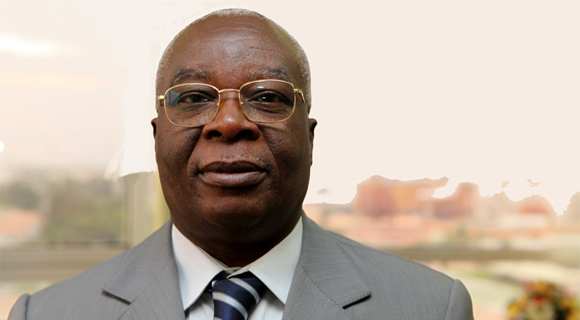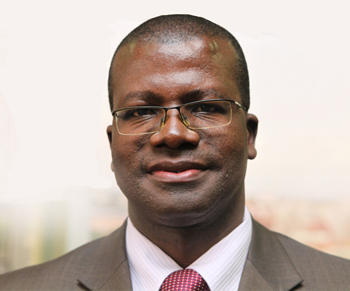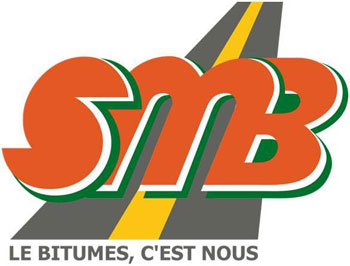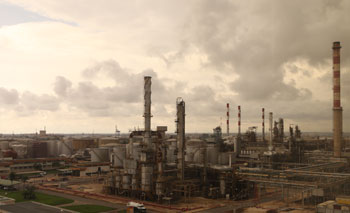Bitumen Production in Africa: SMB
Yves Boha Djere, President of the Board of Directors of the Société Multinationale de Bitumes (SMB) and Thomas Camara, Chief Executive Officer of SMB
The Société Multinationale de Bitumes was founded in 1976 to respond to the need for suitable infrastructure and thus the bitumen production in Côte d’Ivoire began. Up to date, 5 600 km of bituminized roads have been built by Societe Multinationale de Bitumes.
Interview with Yves Boha Djere, President of the Board of Directors of the Société Multinationale de Bitumes (SMB) and Thomas Camara, Chief Executive Officer of SMB

How would you present the Société Multinationale de Bitumes?
Mr. Yves Boha Djere: The Société Multinationale de Bitumes (SMB), a corporation with a board of directors, was founded in 1976 on the initiative of the government of Côte d’Ivoire. It started its activities in 1978 and its capital amounts to 4.872 billion of CFA at present.
Côte d’Ivoire became independent on August 7, 1960. Following this very important milestone, the country experienced full economic growth – back in the times, the world was talking about the ‘Ivorian miracle’. We definitely had a good and steady growth in those days and business opportunities were numerous. The government soon detected the need for a functional road system in order to handle the movements of the trade, goods and people.
Moreover, internationally, the landlocked countries in the region dependent of Côte d’Ivoire needed to be connected with the outside world. The SMB was built on this perceived need for suitable infrastructure. Up to date, we have built over 5600km of bituminized roads.

The minister of transportation has recently announced several major construction projects for 2012: Abidjan, the third bridge, the highway to Bassam and several others. What is your medium-term strategy and how do you think SMB will benefit from the reconstruction of Côte d’Ivoire?
Mr. Yves Boha Djere: For the strategy, it is the responsibility of the Ministry and the government. If you wish to have appropriate responses, it would be good to get in touch with the Ministry. As for SMB, Société Multinationale de Bitumes is aligned with the governmental strategy, which aims to revive the Ivorian economy, including the road sector. We also intend to be fully involved in this process and to become an essential partner.
Besides the above-mentioned method, how is the government channeling its resources to stimulate the economy, especially after the recent Ivorian crisis?
Mr. Yves Boha Djere: Our road network suffers from years of lack of maintenance and is highly degraded. Furthermore, the road system needs to be expanded; there is definitely a demand in this sector. There are also the close-by countries whose infrastructures require a lot of material. Hence, we are working on playing an important role in these regional reconstructions and we will try to meet the demand.
You have an ambition to be ‘legitimately accepted’ as the best bitumen producer and seller in Africa. What projects are planned for the strategic development of the company in order to achieve this goal?
Mr. Yves Boha Djere: We have an investment plan. We will increase the production capacity, it is needed. We shall increase the capacity of production as we shall the quality of our tools. The reason for this is that the available raw material is increasingly acidic compared to formerly used one; hence, we have to adapt and upgrade our equipment. Mr. Thomas Camara, our CEO, is authorized by the board of directors to draw together those guidelines in a plan.
During the 30 years of Société Multinationale de Bitumes operation, there was not a single incident in which the company would be accused of environmental pollution. We are highly aware of the importance of preserving our nature.
Mr. Thomas Camara: We do indeed concentrate on attracting investments to increase our production. The refinery that supplies SMB was built for a capacity of 525 000 tons of crude oil per year. In 2010, we were using our full capacity. Even if producing at full capacity, we are only meeting 45% to 50% of bitumen demand in the sub-region. Consequently, half of the market’s demand is currently covered by imports from Latin America and Europe. As a local business, SMB has to take advantage of its location in the region by fully making its place and investing in production facilities.
We have two major projects: firstly, the quality of our metallurgy has to be enhanced, so that we can work with bitumen rich crude oil. The second project – a medium-term one – consists of replacing certain equipment to increase the production from 80 tons to 120 tons per hour, an increase of 50%.
What is going to be the percentage of the increase in production once these investments are completed?
Mr. Yves Boha Djere: For the first project, we expect an increase of our production by 10% to 20%. For the second project, we expect production to go up by another 50%. Altogether, it would represent almost 60% of increase in our current production level and thus, we could largely cover the needs of our market.
Have you already started the negotiation process with potential investors? In other words, what is your investment strategy?
Mr. Yves Boha Djere: Since these projects require large-scale investments, an estimate of $30 million to $35 million for the first one; we are currently doing pre-investment studies. Once we have the results, we can predict the cost of the investment with an accuracy of 10%.
Henceforward, we seek to reach potential investors. We do already know several companies that are interested in financing those projects. Primarily, they are commercial partners who are interested in the increase of production, but there are, as well, financial partners, banking institutions which are aware of the SMB being not only one of the rare refineries in the sub-region exporting bitumen, but being one of the fittest and most likely to meet the demand. All of this explains our partners’ commitment. Everyone in the industry knows that the Société Multinationale de Bitumes is very essential to the region.

What are the main challenges that you face?
Mr. Yves Boha Djere: If I may complete Mr. Thomas’s outline, the SMB is not merely the most important refinery. Its location in Côte d’Ivoire is also geographically advantageous, right in the heart of the sub-region, and makes exportation to surrounding countries interesting, from Mauritania to Angola. In addition to that, we do have the facilities to supply those markets effectively, at the right time and at a reasonable price. We do have a ship of 5800 tons capacity at our disposal and it constantly supplies those markets. Logistics is an essential element to be expanded in order to supply all our clients in shorter delays.
Mr. Thomas Camara: We are currently negotiating with business partners in Nigeria, which receives 55% of our production at the moment, on how to implement our presence in their storage yard capacity and to secure the market by building customer loyalty. Furthermore, we do target countries such as Equilateral Guinea, Congo and Gabon – they are markets with a great need of bitumen.
Customer satisfaction is highly important to us – this is why we implement international management standards ISO 9001. SMB is certified since 2006 and we follow those guidelines in order to fully satisfy our clients and build customer loyalty.
Beyond doubt, this is a very promising market where you definitely are in a strategic position. However, why would countries such as Nigeria not consider building their own refineries and equivalent of Société Multinationale de Bitumes?
Mr. Yves Boha Djere: Firstly, the crude oil generally available is a raw material used for regular oil products. To produce bitumen, a special type of crude petroleum is required. We import it from Latin America countries like Venezuela, Columbia or Mexico.
Secondly, Nigeria does own three refineries; one of them has a unit for bitumen production. Still, the country imports bitumen from Côte d’Ivoire. Since we offer the product at a competitive price, we may convince the Nigerian government to invest outside its borders given that their domestic demand is already satisfied.
Mr. Thomas Camara: Presently, we meet about 50% of the sub-regions’ demand, which means that there is another 50% left. If we do not meet this demand, someone else will eventually take that place on the market. We aim to remain competitive in providing high quality products as well as related services.
Given your leading position, how do you deal with the aspect of sustainable development?

Mr. Yves Boha Djere: During the 30 years that Société Multinationale de Bitumes has been operating, there was not a single incident in which the company was accused of environmental pollution. We are highly aware of the importance of preserving our nature. Therefore, we always include the factor of environmental impact in the plans regarding new materials and facilities. First of all, we take the SMB as a corporate citizen to whom the protection of its environment is a priority.
One of the steps we have recently taken in order to minimize our impact on the environment is to deliver bitumen in bags as opposed to the previously used barrels. The protection of nature is very important to us. Our CEO Mr. Thomas Camara’s duty is it to implement these guidelines set by the board of directors.
Mr. Thomas Camara: In day-to-day management, we adopted the environmental standards ISO 14001 to assist us in minimizing the impact on the environment. We have already taken the first step and conducted studies in that regard. We work closely with the Ministry of Environment as to permute these standards and become ISO 14001 certified. This will prove that our management, our facilities, and equipments are environmentally-friendly.
To sum up, what is your vision for the company?
Mr. Thomas Camara: As a leader in Western Africa, we strive to take part in the development of the region. This progress can be achieved by developing its road system and infrastructure. We are now and shall remain in future, in a position to implement those strategies and realize projects – following the guidelines given by the board of directors while ensuring the best for the company.
Mr. Yves Boha Djere: We mean to be a flagship company; not only within the country, but also in the sub region. I may repeat at this point that the SMB is a publically-traded business. About 5 years ago, SMB became quoted at the Bourse Régionale des Valeurs Mobilières de l’UEMOA (BRVM)as the second company out of the West African region. For me as a President of the Board of Directors, my role – financial – is to make this company a major one on the market. At a technical level, our role is to be among the companies that will enable Côte d’Ivoire to remain the engine of the West African economy.